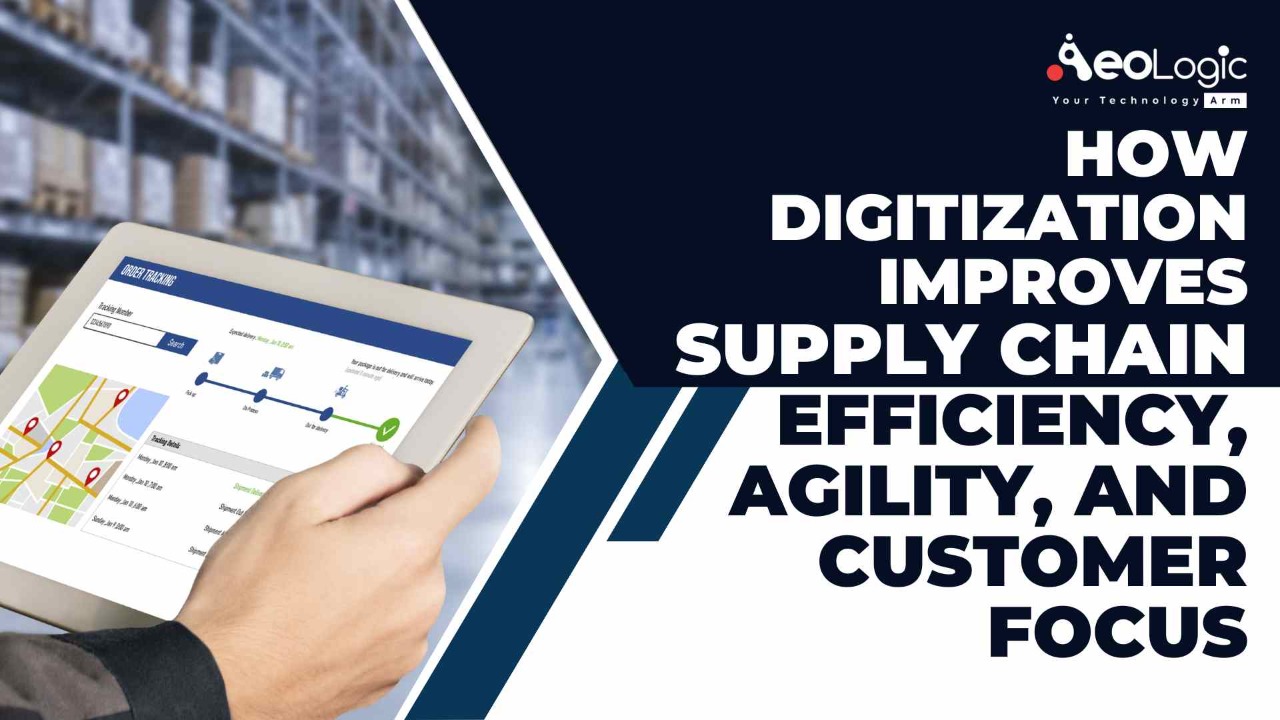Industry 4.0, also known as the fourth industrial revolution, is presently underway. It is the term used to define the rapid technological trend that is driving interconnectivity, automation, machine learning, and real-time data. Digitization in the supply chain is improving efficiency, agility, and customer focus. Today’s supply chain is a series of highly discrete. It is siloed steps from manufacturing, marketing, product development, and distribution to the customer’s hands. Digitization in the supply chain breaks down the barriers. Such as transforming the supply chain into a completely integrated ecosystem that is fully transparent to all of the concerned people involved. Such as from the suppliers of raw materials, components, and parts to the transporters of those supplies and finished goods. And finally, to the customers demanding fulfillment.
In this post, we will assess what a digital supply chain is and how it can improve efficiency, agility, and customer focus.
What is supply chain digitization?
The drive toward a completely integrated sequence of planning and production solutions. It works in parallel to form a more visible supply stream across each touch point of the value chain known as supply chain digitization.
The result is a more responsive, transparent, and agile supply network that can easily adjust to several unknown industry variables. For instance, inventory shortages or oversupply, order modifications, and resource availability. Companies can leverage lower production and operational costs, shorter lead times, and improved reporting and data analysis capabilities. This can fuel improved planning and production programs. As a consequence of this integration and digital transformation.
Also read: How IoT and AI are Transforming Logistics?
Advantages of a Digital Supply Chain
Digitization in the supply chain offers various advantages. The digital revolution has significantly changed modern human society. This era involves supply chain digitization. It is redefining how global supply chains deliver value and operate.
Digital supply chain management is based on electronic technologies, connectivity, data, and advanced analytics. These factors, when combined, provide the following benefits. Specifically, when adopted by all partners along the value chain:
1. Improved visibility into supply chain performance
Compared to traditional supply chains, a digital supply chain offers radically more visibility into its elements and moving parts. Businesses can get real-time visibility into supplier performance. Hence, it allows them to identify gaps that may cause disruptions and then address them. Also, digital supply chains are more customer-centric. So companies can better understand customer needs and take actions to enhance customer experiences.
2. Process automation
The conventional paper-based, manual supply chain operations are substituted with a digital supply chain. It eradicates manual data entry. As well as the requirement for stakeholders to call or email for updates. Thus, all parties gain access to all of the important data. It can also aid in improving their processes without the need for collaboration with a partner company. Business processes are also automating as a result of digitalization. This subsequently improves process efficiency. Additionally, it is increasing worker productivity, performance, and profitability.
Sensors and other digital instruments allow real-time inventory tracking across the supply chain. Lastly, technological connectivity is enabling businesses to improve their supply chains and develop new business ideas.
3. Reduce costs while increasing innovation
Digitization in the supply chain offers real-time, comprehensive data on performance, status, and requirements. Resource planning, raw material flows, operational logistics, inventory levels, and forecasting, are all processes that can benefit from this data. These are immediate benefits of increased cash flow and expense savings.
Better information sharing and collaboration allow for the recognition of process bottlenecks, the reduction of time-to-market, and the acceleration of innovation. As well as the improvement of the return on the invention.
4. Advanced analytic and data
Several data-driven technologies, such as big data, machine learning, IoT, and predictive analytics, allow the digital supply chain. Businesses are connecting and associating data sources for better inventory management and preventive maintenance. They can use data to identify inefficiencies, better product quality, and enhance customer service.
Advanced analytics that depicts data can be provided via a digital supply chain, enabling users to learn from mistakes, make predictions, and improve decision-making.
5. Improve supply chain planning
Recognizing potential problems and forecasting their consequences in old-style supply chains can be time-consuming and unreliable. Shared and up-to-date quality and control data in a digital supply chain allows companies to foresee issues. Additionally, it responds quickly before the problem escalates.
Furthermore, digital supply chain management streamlines the planning and management of all supply chain workflows, including:
- Sourcing
- Procurement
- Conversion
- Inventory management
- Logistics management
Companies can advance the performance of the end-to-end value chain by better coordinating and collaborating with various stakeholders. Such as third-party service providers, vendors, intermediaries, and customers applying digital tools and technologies.
Also read: The Future Logistics & Supply Chain Technologies
Conclusion
Digitization in the supply chain has several advantages over the traditional approach to the supply chain. Advances in digital technology are allowing companies to improve their supply-chain performance quickly at a modest cost. Our experience advises that companies reap greater benefits when they develop a comprehensive vision for future planning.
Talk to our industry experts at Aeologics Technologies if you are planning for digitization for your business!
FAQs
What are the technologies used for digitizing the supply chain business?
Cloud computing, software as a service (SaaS), big data, intelligent automation, machine learning, blockchain, and many more.
What are the benefits of a digital supply chain?
Advanced analytics and data, improved supply chain planning, decreased costs while increasing innovation and better visibility into supply chain performance are some of the benefits.









